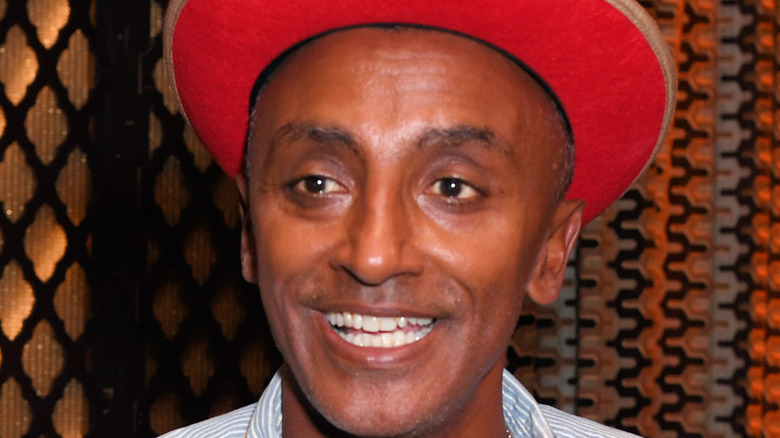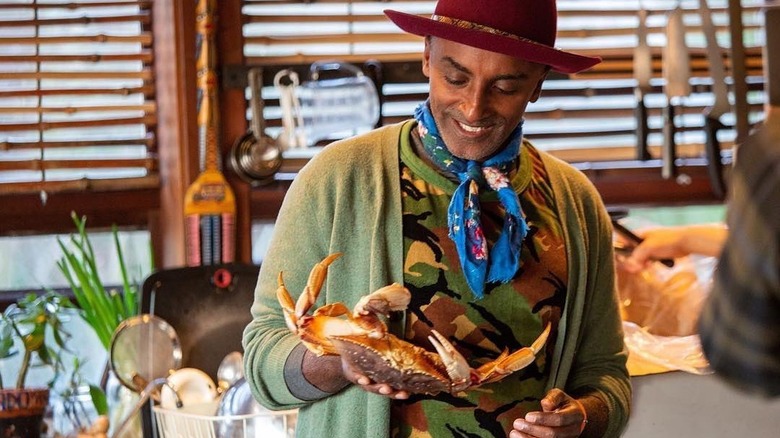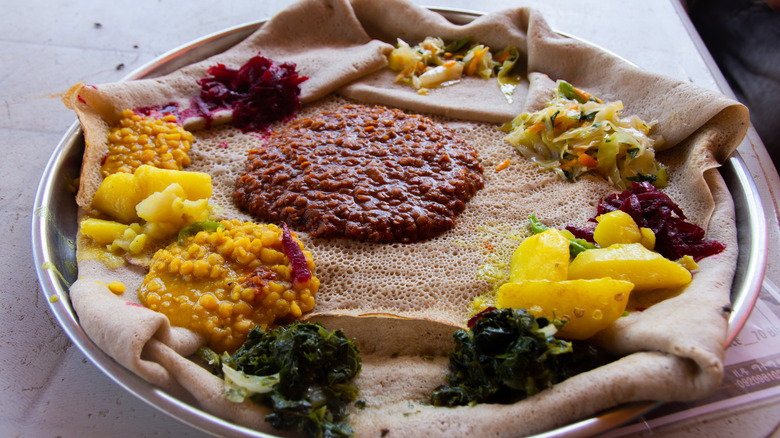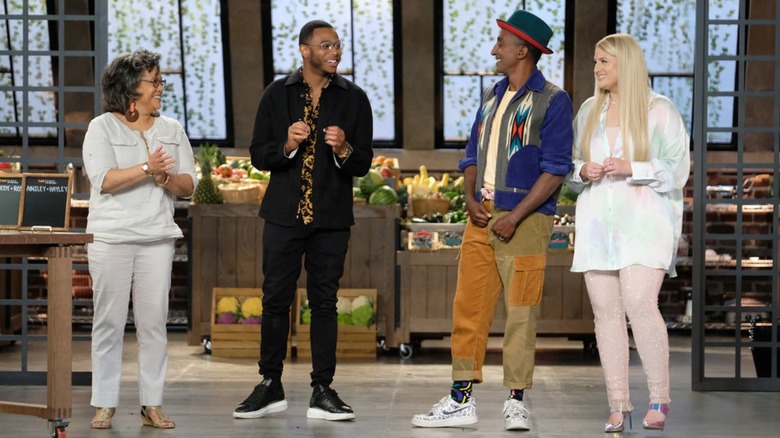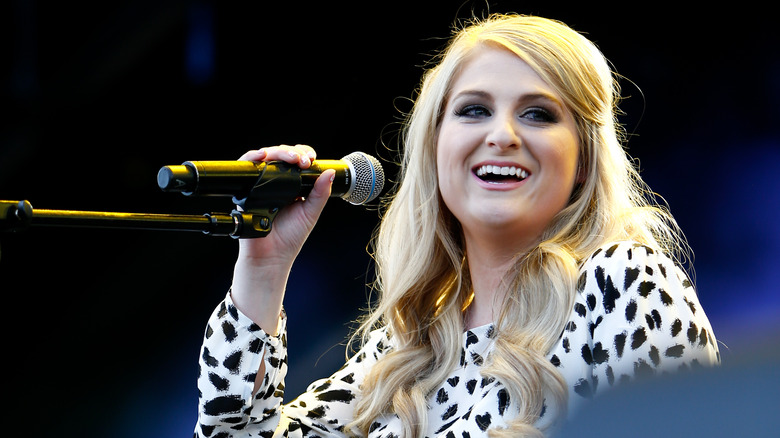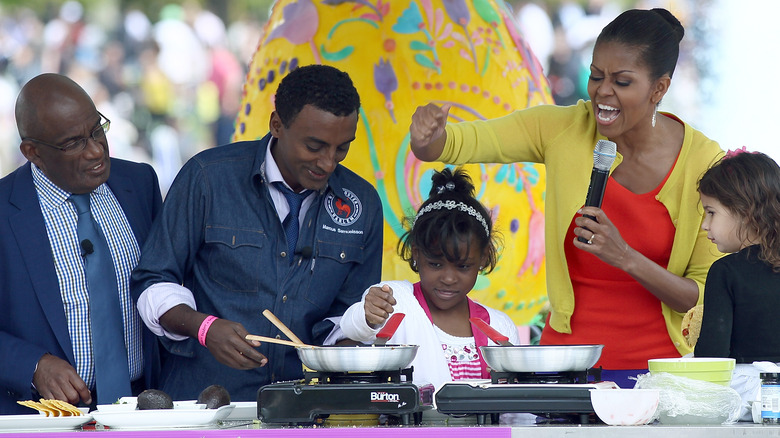Marcus Samuelsson Talks Top Chef Family Style And Working With Meghan Trainor - Exclusive Interview
Marcus Samuelsson has come pretty far since he first arrived in the United States with just $300 to his name. In addition to his James Beard award, successful Red Rooster restaurants in Harlem and Miami, and experience cooking for (and with) luminaries ranging from Selena Gomez to Michelle Obama, the culinary celebrity has been a mainstay of the cooking TV circuit ever since he won Season 2 of "Top Chef Masters" in 2010. Samuelsson spent the next decade competing and judging on a wide array of foodie favorites, ranging from "Chopped" to "Guy's Grocery Games" to "The Best Thing I Ever Ate" (via IMDb).
Most recently, Samuelsson returned to his "Top Chef" roots to join singer Meghan Trainor as co-host of "Top Chef Family Style," a new Peacock show which pits aspiring teen chefs against each other — with some help with a sous chef from each of their families. In an exclusive interview with Mashed, Samuelsson shared what it's been like to watch these young talents compete, how the show has made him reflect on his own career path — plus, how his unique heritage as an Ethiopian-born, Swedish-raised chef has influenced both his palate, and his perspective.
Marcus Samuelsson reflects on his career and his heritage
What was it like to win "Top Chef Masters"?
It was amazing. I mean, it's something that you're away from your family and friends so long, and you don't have access to your phone or anything like that. I think I was away eight or nine weeks. So it's that emotional rush of just, wow, you climbed up this mountain and it was amazing. Sure, I made great friends, friends who we are very close to, still to this day. But it's a different experience when you're far away from your family, and you wake up and you're in a different environment, and you have to cook not in your kitchen. It was tough, but it was also fun.
What's been the highlight of your career so far?
I would say the highlight for me is to be able to work with something that my grandmother taught me in her kitchen when I was six, seven, eight, nine, 10. The fact that she taught me so much out of love, and out of just the love for food and family — the fact that I've worked all over the world with that trade. And I'm just as passionate about food today as I was when I started a long time ago. That's been an amazing experience. When I joined "Top Chef Family Style," obviously the legacy of "Top Chef" is amazing, but with "Family Style," I could really see myself going back cooking with my sisters, or cooking with my grandmother, or cooking with my dad. And it was just so much fun to me to watch the teams develop, the kids being young prodigies working with their auntie, uncle, dad, mom, whatever it was. And it was just a lot of childhood memories coming back.
Who has had the most influence on your career as a chef?
I think that goes in stages. In the beginning, it was definitely my grandmother, even before I knew I wanted to be a chef. I would say once I started cooking with some chefs back home in Gothenburg, that they saw something in me ... even earlier than maybe even my parents saw that this was my path. I had a chance to get to Switzerland and Japan very early. And I mean, for me, the whole relationship with mentorship and mentee is something that I've addressed all my career, because I had great mentors to guide me. I still have great mentors to guide me.
There's several mentors. I would say someone like Chef Charlie Trotter that passed away about eight years ago now, in Chicago, and Chef Leah Chase, out of New Orleans that just passed away a couple years ago. People like that really took me under their wing and guided me and coached me.
Marcus Samuelsson discusses how his background influenced his outlook on food
How does your background influence your approach to food?
I think being both Swedish and Ethiopian influences [me] day-to-day. I would say the Ethiopian, just being African, being connected to the continent, I see a lot of [that] in American food and especially African American food — there's so many links to [the] continent of Africa. Being able to relate to it both from an emotional side but also from a historical side, I think that gives me an understanding to understand Southern food in a different way, for example.
But then also the Swedish side. Understanding design from a different way, and aesthetics. There's a lot of techniques in Sweden — smoking, pickling, foraging, for example — that fits modern and cooking. I find that we all have different journeys and stories, and everyone has an advantage depending on how they activate their culture, whether you're Polish and Chinese, whatever. That's the beauty in America, everybody has a story and a journey.
What are some of those connections you see between African American cuisine and Ethiopian cuisine?
Well, there's a historical sense of using spice, for example. There are, of course, no waste, so everything is being utilized. And then I think a lot about West African food and the usage of rice and grits and how that came to America, for example. Even barbecuing, the root of barbecuing, how you use fire and how you use smoke, also has origin in Africa. There's many things. It's also about having respect for other cultures that for whatever reason haven't been uplifted. And I think my work has always been around "how do you tell the story?" And, how do you uplift more Black stories in American food?
Is there one type of Ethiopian food that you think Americans should try?
Yeah. I mean, there's tons of great food. The great thing with Ethiopian food is [it's] probably the most [prevalent] in every major city in America — there are many Ethiopian restaurants. Injera bread is kind of our staple. We eat with this big sourdough pancake. And we eat with our hands. So I would say a Doro Wat stew with a chicken stew, it's a little bit spicy, but it's fun to break that bread and chicken. Whether you're on the West Coast, in the middle of the country, or in the South or the North, you can have that dish and it's delicious.
Do you think it's hard for people to kind of think of the concept of eating with their hands?
No. Americans eat with their hand constantly! We eat hot dogs, we eat pizza, we eat tacos. We eat so many great meals with our hands. Absolutely not. Generally, Americans are very curious. When I travel in this country, go to places like Houston or Atlanta or Miami, not just New York and Los Angeles, it's so diverse. The food we cook in this country is like nowhere else because we have our diversity, and that's what makes it so interesting to really be a foodie in this country.
When you were speaking before about Swedish food, you mentioned pickling and foraging, which the typical home cook might not know much about. Can you explain why those techniques are important?
I'll go back to the show — it was amazing to see, first of all, the diversity within the families, whether it was from Hawaii or from Houston or from Alaska. It was really showing America — how grand and how big it is. Someone that comes from Alaska has actually more similarities to Swedish Nordic culture because of the weather. And so, game meats and pickling and preserving and smoking — we saw that in the show ... I think that I grew up in a country, it's a smaller country, but we have a lot of nature, and, obviously, cold winters, but four strong seasons — which meant that farm-to-table was how we ate. Not because we ate in restaurants, but because of what was around us. So in fall, we picked our mushrooms and we then preserved them over the winter. In late summer, you picked your berries. In early spring, you picked your rhubarbs and your onions and so on. So, it was having access to nature, like I had in Sweden. [It] has been game-changing for me.
This is what's special about the teens on Top Chef Family Style, according to Marcus Samuelsson
Why did you become involved in "Top Chef Family Style"?
Well, I mean, I won "Top Chef Masters" years ago, and it was an incredible experience. But also being part of the legacy, I mean, being part of what Padma [Lakshmi] and Tom [Colicchio] and Gail [Simmons] and the whole legacy — it's really been amazing to be a judge and see the talent pool of young American chefs. And it's changed our industry.
Now with "Family Style," what I think it's so amazing is that you can compete as families within the families! You can invite the cousins and do your own competition. It really goes to the core of American cooking. It does not always have to be in restaurants. Everyone in the family can join in. And every time you kind of broaden our industry in a positive way, I want to be a part of it.
Was there anything that surprised you about the teams competing in the show?
I was blown away by the talent, of especially the young chefs. They're not just kids, they're chefs! They're going for it. They use techniques, and they're completely fearless. They're going for techniques that I couldn't go for at that age. It was just their devotion to the craft, I really loved that. It was very hard for the adults to keep up!
How Marcus Samuelsson feels about his co-host, Meghan Trainor
What was it like to work with Meghan Trainor?
I mean, Meghan is amazing. She's just fun to be around every day. She brings her whole family, mom, sometimes her dad's on set, their family, her husband, brothers, everybody. It's a tribe, which is so much fun because it's really family, it's "Family Style." And guess what? She brought her own family. So I brought my family, too. She just makes the set fun and engaging. And, of course, that she's a rockstar doesn't hurt. In between sets, she was coming up with songs. She's just really fun to be with and very curious to learn. She's very open about, "hey, maybe I haven't had this before." And she was very much the viewer very often, but open to learning new things. She also loved hanging out with [the] chefs, because she tours. Wherever Meghan's going to go on her tour, she will eat well, I can guarantee you that!
Does she cook?
Her dad cooks — I know that. Mom cooks, dad cooks. Even her brother cooks sometimes. Meghan eats! I think she cooks a little. She's definitely cooking more now after "Top Chef Family Style," but I mean, she was great. I just hope we can work together again and do another season because we had so much fun and we had great chemistry.
Did she enjoy the food that the contestants cooked?
Yeah, I mean, we were both blown away with the contestants. You don't have to be super knowledgeable either to see or smell or taste when great food is around you. Your eyes light up and you just want to go for it! So there were many times where she just like, "Wow, oh my God!"
How did you feel about the Magical Elves production company that put on "Top Chef Family Style" and "Top Chef Masters"?
Well, I mean, the great thing with Magical Elves is, obviously, they started it all. They know "Top Chef" better than anybody. Especially now, we have new things with "Family Style." We're working with kids, for example, so different rules than when you do the original "Top Chef." So it's just great to be able to discuss with Magical Elves when we didn't how this would work — we still shot it during the pandemic. There were a lot of rules. And it was great to have that trust and know-how in the legacy of the brand. And they're just great. They truly know how to produce great food TV, but they don't need me to say that! They know that. But it was also great to be on set to see that. And they care. They care about the contestant. They care about the show, clearly.
Marcus Samuelsson dishes on cooking for Michelle Obama -- and why he skips junk food
What is it like to cook for Michelle Obama?
She's the boss, so it was fun — but you have to prepare, get ready for it. I'm cooking with her soon again for something. It's going to be fun. And she's amazing. We always have fun. It's fun. I've cooked with her on TV, I've cooked with her privately. And then a couple other occasions, a State Dinner, of course. But she's amazing. I just think that when we plan a menu together, we go back and forth. And then I just try to do my best. If not, she will let me know!
If you could ask one chef to cook you dinner, who would it be?
Wow. There's so many great chefs in this country. There's many. I mean, I love Nancy Silverton. I just love Nancy. I love Nyesha Arrington in LA. Melissa King, amazing. She won "Top Chef" a couple years ago. [Any] of them, sign me up, I'm there!
As a chef, is there one ingredient that you can't live without?
Fish. I grew up on the water, so yeah.
What's the most popular item on the menu at your restaurant, Red Rooster?
Both in Miami and here in Harlem, I would say our fried chicken is very often what people come for. And then they go in different directions. They might take shrimp and grits. They might go to something else, but they come in for the fried chicken. On weekends, maybe fried chicken and waffles. But there's so many great things on the menu. I just love to see that families are back, enjoying their time at Red Rooster. It just makes me happy.
Do you ever eat fast food, and if so, what do you eat?
I mean, sometimes I eat fast because I'm on a run. I mean, I enjoy a good burger. I make it for my family. My son enjoys it. It's fun, especially in the summertime when we go out to eat. You can put the grill on. I love that. There's nothing wrong with fast food. I mean, junk food and fast food are two different things, right? So you can make fast food at home that is super delicious and healthy. I try to avoid [going] to big chains.
So you never do drive-thru?
It's just not what I have to do. I'd rather go to that tiny place in a different part of town and get noodles or get something else. It's just more my preference, you know? But I love street food, for example. Yeah. I love eating on the street, and I love honest cooked food on the street. I love it.
Do you have a favorite street food?
I would say tacos.
Learn more about Magical Elves, the company that produces "Top Chef Family Style" and other cooking shows.
